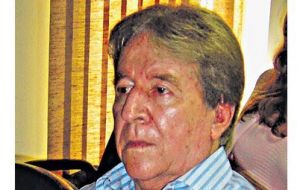MercoPress. South Atlantic News Agency
Brazilian judge dismisses first dictatorship era case involving an Army officer
 Colonel Sebastiao Curio Rodrigues de Moura, 77, commanded troops in the Amazon region
Colonel Sebastiao Curio Rodrigues de Moura, 77, commanded troops in the Amazon region Brazilian judge dismissed the first charges ever brought against an army officer over crimes committed during the country's 1964-1985 military dictatorship, dealing a blow to rights groups and victims' families.
Prosecutors brought charges this week against Colonel Sebastiao Curio Rodrigues de Moura, 77, who commanded troops they say kidnapped and tortured five members of the Araguaia guerrilla movement in the Amazon that was fighting to impose communism.
Human rights groups had applauded the charges as a “landmark step for accountability in Brazil,” which critics say has taken only timid steps to deal with that dark chapter in its history. The fate of the five and several hundred others has never been discovered.
Prosecutors argued the kidnapping of the five was not covered by a 1979 amnesty law because they were not found and the case never closed. The prosecution argument heeded a 2010 decision by the Inter-American Court of Human Rights that Brazil must investigate those kidnappings and punish the perpetrators.
In dismissing the charges, Federal Judge Joao Cesar Matos argued they were covered by the amnesty law.
“Pretending that you can skirt around the amnesty law to reopen the debate over military dictatorship-era crimes ... disregards the historical circumstances which, in a great effort of national reconciliation, led to its implementation,” the judge said in a statement on the Federal Justice website of Para state.
The judge added that even if he accepted the case, the legal time limit for a sentence to be given had passed.
Federal prosecutors in Para state said they would appeal the judge's decision.
The accused colonel was a notorious figure from the dictatorship period that began after a military coup. He took over the running of the region in the Amazon where his troops were stationed and earned a fortune overseeing artisanal, or small, independent mining.
The judge's decision came on the day Defence Minister Celso Amorim called for the powers of a recently established truth commission to be expanded to enable it to investigate all the wrongdoing of the era.
Brazil's military dictatorship was less murderous than those in Argentina and Chile, but the country's leadership has been criticized for not doing more to investigate the violent acts committed and mete out punishment to those responsible.
About 475 people are estimated to have been killed or have disappeared during the dictatorship.
The issue is also a delicate one for Dilma Rousseff, Brazil's first woman president, who was herself a left-wing combatant during the dictatorship, subjected to torture at the hands of the military and imprisoned.
Rousseff has been careful to avoid creating the perception she is out to avenge the wrongs she suffered.
There is strong resistance against repealing the law among the military, many of whose dictatorship-era officers have yet to retire and argue the military saved Brazil from a communist revolution.




Top Comments
Disclaimer & comment rules-

-

-

Read all commentsbag.. money... in a ... allegedly.
Mar 17th, 2012 - 11:01 am 0Twenty years of military rule with an average of around 20 people killed or disappeared each year.
Mar 17th, 2012 - 04:49 pm 0The present 'authority-induced' mortalities/disappeareds, in the back-country and in and around the favelas, are much greater than this in Brasil at the moment, and this is a contemporary civil democracy.
I'm not excusing the military era - and I do know a bit about it from personal friends and contacts - but we now have some perspective and comparisons with other South American nations that did similar things over the same period.
Military-governed Brasil was not 'clean' but, equally, it was not a totally evil regime. Today - and for right or wrong - in the West we call it 'hunting down the insurgents'.
There IS the amnesty in place and this is of immense importance.
Dilma allowed the case to be brought and it took its course and acquitted, perhaps on a technicality.
We know other South American nations where the legal arm of government runs at the whim of the president - though there are still problems with the application of law in Brasil, Brasilian legal systems are much less corrupt.
Though I would have prefered a Truth *and Reconciliation* Commission if there had to be investigations within the Amnesty, this judgement has shown the increasing maturity of Brasil as a nation.
the amnesty could (if they wanted to) be dropped very easily.
Mar 19th, 2012 - 11:43 am 0if they were crimes against humanity, they never prescribe.
Commenting for this story is now closed.
If you have a Facebook account, become a fan and comment on our Facebook Page!